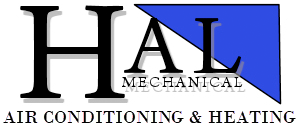When replacing the air conditioner and heating system, many homeowners fall into the trap that bigger is better. When installing an HVAC system, you never want to install a bigger or oversized unit. Many people will assume that a bigger unit means faster cooling and less power. However, this is not how air conditioning units work. To better understand why you will want to avoid an oversized HVAC system, Hal Mechanical will share the risks of an oversized HVAC system.
Poor or No Air Balancing
When installing an oversized HVAC system, one common problem everyone encounters is poor or even no air balancing. During the winter an oversized unit will produce too much heat, and in the summer it will produce too much cold air. It will also produce the air too fast which means, the air never has the proper time to spread and circulate throughout the entire home. As a result you will have hot and cold spots in the home and never a constant temperature. Air balancing problems can cause additional stress to the HVAC system which can lead to mechanical problems prematurely.
Short Cycling with an Oversized AC Unit
Short cycling is when an air conditioner or the heating system will start up and suddenly shut off. These rapid sessions are known as short cycling. Short cycles prevent the HVAC system from completing a cycle and the home will never reach proper temperature balancing. Short cycles also contribute to premature wear on the HVAC system. The compressor and blower fan motor often takes the biggest hit when an air conditioner develops short cycling problems. Repairing or replacing the compressor and the fan motor is a major expense. To avoid unnecessary cost in repair you should never use an oversized HVAC system.
Shorter AC Lifespan
Another common side effect of having an oversized unit is a short lifespan. On average an HVAC system should last between 15 to 20 years with major repair toward the end of the unit’s life. Premature repairs and a shorter lifespan is due to the compounding problem of an oversized HVAC system. To avoid early replacement you should never use an oversized unit.
How Do You Know if Your Air Conditioner is Oversized?
To know what makes an HVAC oversized you need to understand how the heating and cooling systems are measured. A heating system, such as a furnace, is measured by its BTUs (British thermal Units) which describes the amount of work it requires to heat the home. For the cooling system, its cooling power is rated in tons. A single ton of cooling equals to 12,000 BTUs and a 4 ton A/C unit produces 48,000 BTUs cooling capacity. Depending on the size of the home it will require a certain amount of a cooling and heating capacity. The internal heating and cooling space must be calculated to know how much BTUs you will need and never exceed the capacity.
Central Air Conditioning Installation, Replacement & More in Aliante, Anthem, Desert Shores, Eldorado, Enterprise, Green Valley Ranch, Henderson, Inspirada, Mountain’s Edge, North LV, Peccole Ranch, Paradise, Providence, Rhodes Ranch, Seven Hills, Silverado Ranch, Spring Valley, Summerlin, Sunrise Manor, The Lakes, Tuscany Village & Las Vegas Nevada
If you need help calculating and determining the right size HVAC system you need, contact the professionals at Hal Mechanical. For air conditioning replacement, installation, and more contact Hal Mechanical today.






